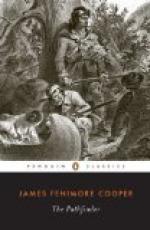The party had taken their places around a platter of venison steaks, which served for the common use, and the discourse naturally partook of the characters of the different individuals which composed it. The Indians were silent and industrious the appetite of the aboriginal American for venison being seemingly inappeasable, while the two white men were communicative, each of the latter being garrulous and opinionated in his way. But, as the dialogue will put the reader in possession of certain facts that may render the succeeding narrative more clear, it will be well to record it.
“There must be satisfaction in this life of yours, no doubt, Mr. Pathfinder,” continued Cap, when the hunger of the travellers was so far appeased that they began to pick and choose among the savory morsels; “it has some of the chances and luck that we seamen like; and if ours is all water, yours is all land.”
“Nay, we have water too, in our journeyings and marches,” returned his white companion; “we bordermen handle the paddle and the spear almost as much as the rifle and the hunting-knife.”
“Ay; but do you handle the brace and the bow-line, the wheel and the lead-line, the reef-point and the top-rope? The paddle is a good thing, out of doubt, in a canoe; but of what use is it in the ship?”
“Nay, I respect all men in their callings, and I can believe the things you mention have their uses. One who has lived, like myself, in company with many tribes, understands differences in usages. The paint of a Mingo is not the paint of a Delaware; and he who should expect to see a warrior in the dress of a squaw might be disappointed. I am not yet very old, but I have lived in the woods, and have some acquaintance with human natur’. I never believe much in the learning of them that dwell in towns, for I never yet met with one that had an eye for a rifle or a trail.”
“That’s my manner of reasoning, Master Pathfinder, to a yarn. Walking about streets, going to church of Sundays, and hearing sermons, never yet made a man of a human being. Send the boy out upon the broad ocean, if you wish to open his eyes, and let him look upon foreign nations, or what I call the face of nature, if you wish him to understand his own character. Now, there is my brother-in-law, the Sergeant: he is as good a fellow as ever broke a biscuit, in his way; but what is he, after all? Why, nothing but a soldier. A sergeant, to be sure, but that is a sort of a soldier, you know. When he wished to marry poor Bridget, my sister, I told the girl what he was, as in duty bound, and what she might expect from such a husband; but you know how it is with girls when their minds are jammed by an inclination. It is true, the Sergeant has risen in his calling, and they say he is an important man at the fort; but his poor wife has not lived to see it all, for she has now been dead these fourteen years.”




